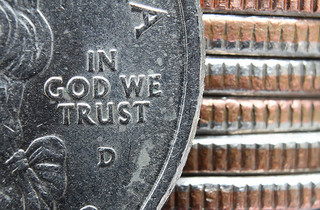 A year or two after I realized that Santa was really my mom, I also realized she didn’t go out to buy and wrap gifts on Christmas eve. The gifts had to have been acquired well before and therefore had to be hidden somewhere in our house!
A year or two after I realized that Santa was really my mom, I also realized she didn’t go out to buy and wrap gifts on Christmas eve. The gifts had to have been acquired well before and therefore had to be hidden somewhere in our house!
One day I went snooping to find them. My adult cousin lived with us, and I thought her room would be the perfect hiding spot. When I came across several stacks of quarters in her dresser drawer, I forgot all about the Christmas presents. I just stared at all those quarters. Surely she wouldn’t miss a few of them.
Confessing my sin
Somehow Mom found out. I don’t think my cousin told her. I think it was that extra set of eyes the Holy Spirit puts in the back of the heads of mothers with difficult children. I got a stern lecture that I still remember more than four decades later. What I remember most was her final sentence: “Nicky, you have to go to confession!”
What I confessed to was stealing, which was, of course the sin I had committed (although at the time I didn’t think it even came close to the dollar threshold for “mortal”). The sin I did not confess was injustice (which, if I had been aware of it, would have sailed right past the “mortal” threshold). I had no right to be snooping in my cousin’s room. Mom covered that in her lecture, of course, but the big sin according to her and to the priest and in my heart was stealing. I barely considered the injustice to my relationship with my cousin, especially since I had given back all the quarters.
How many quarters equal a mortal sin?
Here is where I sometimes get stuck when I have to talk about the sacrament of reconciliation with catechumens. Deep in my heart, I am still eight or nine years old, calculating how many quarters add up to a mortal sin. But now instead of quarters it’s bigger stuff. The sexual sins are probably at the top. The money sins are right up there. Five miles above the speed limit is venial, but 100 mph is definitely mortal. I feel like war and global warming should be on the mortal list, but don’t think I should have to confess them. These are all different forms of pilfered quarters in my pocket. They are focused on the “thingness” of the sin and not on the people I love.
“Reconciliation” is not the official name of the sacrament, but perhaps it should be. (“The Rite of Penance” is the name on the book.) Reconciliation is not about returning the quarters. It is about restoring the relationship. God made a deal with Abraham because God was crazy in love with Abraham. Abraham’s decedents broke the deal, and the Old Testament is a very long love story about God trying to get us back into a loving relationship. God couldn’t care less about the quarters. God just wants us to look at him, face to face, always.
Jesus was the climax of all these efforts to get us back. God gave us an actual, real, human face to look at and fall in love with. Jesus’ entire purpose was to get us back—to reconcile us to the Father. This reconciled relationship is what Christians mean by “justice.” If I had never taken the quarters, the injustice would remain. I was not loving—the way Christ would love—to my cousin that day.
Sin is about injustice
Looked at this way, global warming and other “social” sins have to go into my examination of conscience as do any other parts of my life that contribute to injustice for others. If I am not doing something to make things right (righteous), I am perpetuating the injustice. My mission, in Christ, is to set things right. To reconcile all things to the Father.
For most catechumens, this is news. For many, it is even good news. They do not usually come to us with this notion of justice already in their hearts. For most of them, justice means putting the quarters back and maybe paying a fine or spending some jail time. To see that they have to instead restore all relationships back to the holy order of the original creation—back to a state of constant love—that requires a new way of thinking. It requires conversion.
What the catechumens have to know
The sacrament of reconciliation is, indeed, about confessing our sins, in number and kind, to a priest—but it is so much more than that. It’s about loving God and the people God loves. The catechumens have to learn that if they are going to live as Christians.
Photo: “In God We Trust” by Stephen Klein (Flickr)







